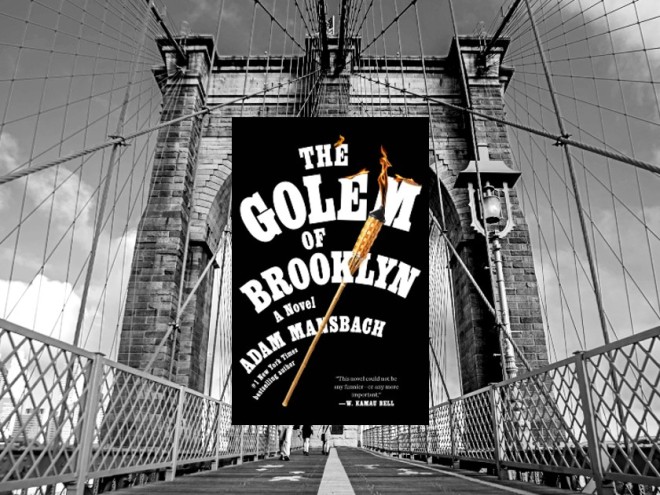The golem is a recurring figure in Jewish folklore, brought into existence by rabbis or prophets to protect persecuted Jews. In The Golem of Brooklyn, however, it is not a rabbi or a prophet who brings the golem back into existence after its recent eighty-or-so-year slumber; it’s Len Bronstein, an art teacher at a private school in Brooklyn. When the golem arrives, there is no apparent threat against which to protect the Jews — and so it’s up to Len and those who join him along the way to keep the golem from causing destruction in its seemingly unstoppable effort to find and eliminate threats to the Jewish people.
The Golem of Brooklyn is a hilarious romp, similar to Harold and Kumar Go to White Castle in its silliness, unpredictability, and use of juvenile humor. But this doesn’t mean that the book shies away from heavy, complex themes. In search of antisemitism for the golem to stamp out, Len teams up with Miri, a woman who was ousted from her ultra-Orthodox Jewish community for being a lesbian. Together, they confront the looming threat of antisemitism and Neo-Nazism in both online and in-person spaces. For someone like Len, who has lived a primarily secular life, the threat is vague and not easily accessible; but for Miri, it is much more immediate. They find themselves at an ideological crossroads: is it right for the golem to kill antisemites, as it has been in the past — say, during the Holocaust — or is it wrong, because the threat is not as apparent as it was then?
While the novel is interested in the present moment, it also takes history to task. There are multiple five-to-ten-page passages throughout the book that detail the history of the golem and of Jewish persecution — which, in a book as small as this, is a sizable amount. These passages read almost as if they’re from a textbook, yet they’re filtered through the charming, irreverent-adjacent voice of the narrator, giving some life to sections that might otherwise be dry.
In addition to the historical passages, there are multiple changes in point of view throughout the book that, although interesting, sometimes seem to clash with the novel’s forward momentum. Early on, a chapter is told from the perspective of a bodega cat, and later, there are two chapters narrated by an antisemitic police officer who is putting together a white supremacist rally. Both are engaging perspectives, and they do lay down the foundation for what’s to come, but they shift the focus away from where the energy of the plot appears to be located.
For those who want a serious reimagining of how a golem might exist in twenty-first century America, The Golem of Brooklyn might not be the best choice; however, for the rest of us, it is a fun, fast-paced novel with loads of wit, humor, and insight.
Benjamin Selesnick is a psychotherapist in New Jersey. His writing has appeared in Barely South Review, Lunch Ticket, Tel Aviv Review of Books, and other publications. He holds an MFA in fiction from Rutgers University-Newark.




